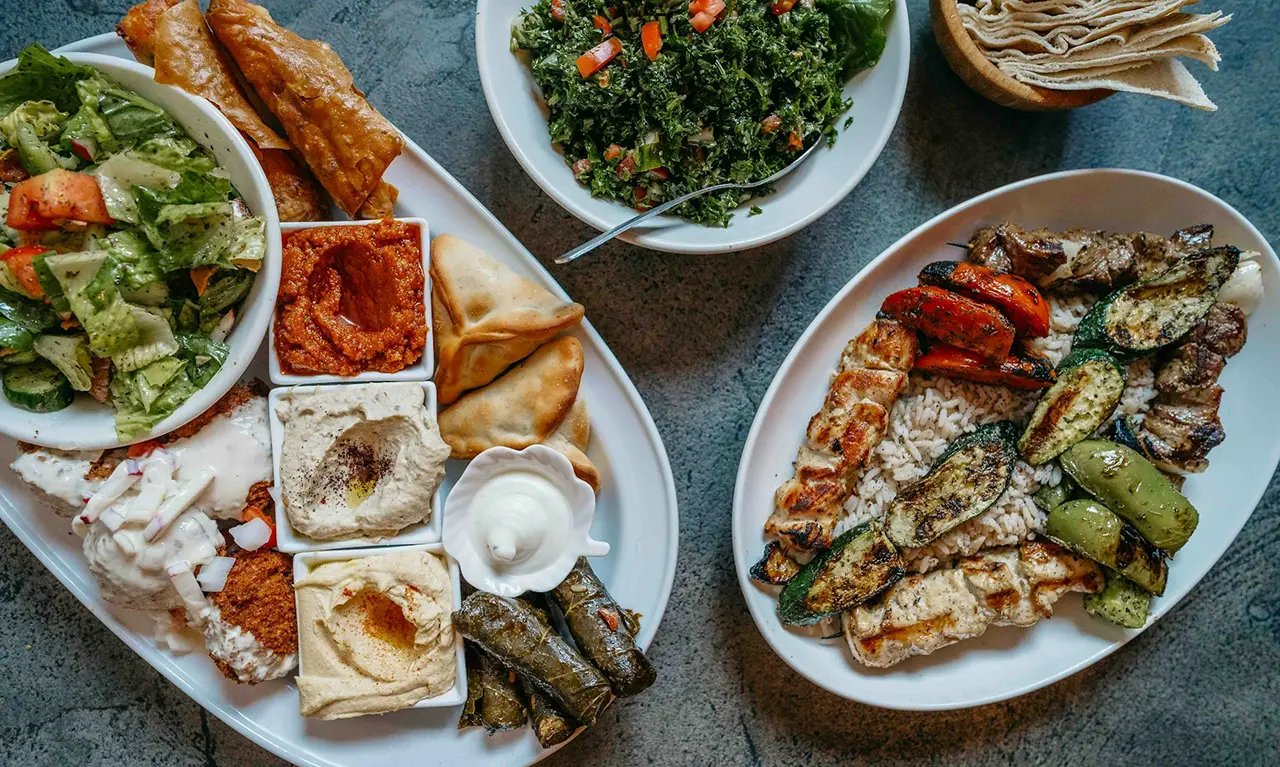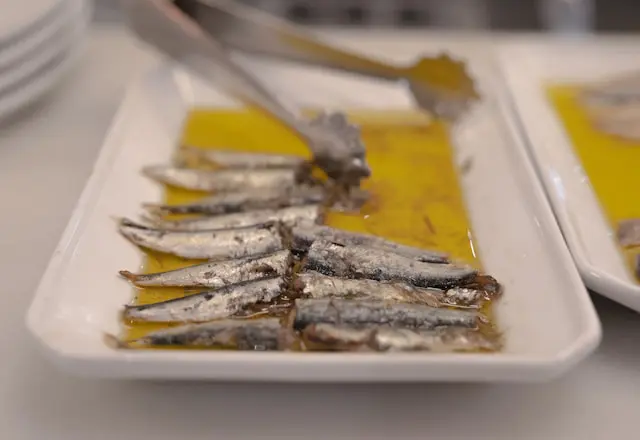
Imagine a vibrant table of Mediterranean small plates, a symbol of sharing and connection. From Greece to Egypt, these dishes celebrate fresh ingredients and local traditions, inviting guests to slow down and enjoy each bite. Whether it's tzatziki in Greece or hummus in Lebanon, these small plates embody the heart of Mediterranean dining.
Picture this: a sun-drenched table spread with an array of small plates, each brimming with bold colours, enticing aromas, and irresistible flavours. Friends and family gather, the clinking of glasses punctuated by laughter, as hands reach eagerly for bites of creamy dips, tangy salads, and crispy fritters. This is the heart of Mediterranean dining, where food isn’t just sustenance—it’s a shared experience, a cultural tradition, and a way to bring people closer together.
Known as “meze” in Turkey and Lebanon, “mezedes” in Greece, and “muqabilat” in Egypt, these small plates embody the Mediterranean ethos of sharing and connection. More than a collection of dishes, this tradition is a way of life. It’s about slowing down, enjoying the moment, and creating bonds over food. In this post, we’ll explore the origins, cultural significance, and regional variations of these small plates, highlighting iconic dishes like hummus, baba ghanoush, dolmas, and falafel. We’ll also delve into the unique dining experience that makes them more than just a meal.
The tradition of small plates has deep historical roots, with the word “meze” deriving from the Persian mazze, meaning “taste” or “snack.” The concept spread through trade routes, evolving as it travelled across the Mediterranean. Each country embraced it in its own way, incorporating local ingredients and cultural practices.
At its core, this tradition is about hospitality. Offering a variety of small dishes is a way to welcome guests, make them feel at home, and encourage conversation. These plates are meant to be shared, passed around the table, and enjoyed at a leisurely pace. Whether in a bustling taverna in Greece or a cosy Lebanese family gathering, they create an atmosphere of warmth and connection.
In Greece, small plates, or mezedes, are a celebration of simplicity and fresh, local ingredients. Popular dishes include tzatziki (a refreshing yogurt and cucumber dip), dolmades (grape leaves stuffed with rice and herbs), and grilled octopus, often marinated in olive oil and lemon. These plates are typically accompanied by a glass of ouzo, the anise-flavoured spirit that enhances the meal’s bold flavours.
In Turkey, meze is an integral part of social dining. Dishes like haydari (a yogurt dip with herbs), acılı ezme (a spicy tomato and pepper salad), and sigara böreği (cheese-filled pastries) showcase the country’s rich culinary heritage. Turkish meze is often served alongside rakı, the national spirit, and reflects the blend of Central Asian, Middle Eastern, and Balkan influences.
Lebanese mezze is renowned for its variety and bold flavours. Staples like hummus, baba ghanoush, tabbouleh, and kibbeh (ground meat and bulgur croquettes) are a feast for the senses. In Lebanon, these plates are central to hospitality, often forming the centrepiece of celebrations and gatherings. Mezze in Lebanon is typically accompanied by arak, an anise-flavoured liquor.
Egyptian small plates, or muqabilat, highlight the country’s agricultural abundance. Dishes like ful medames (stewed fava beans), ta’ameya (Egyptian falafel made with fava beans), and a variety of pickled vegetables reflect Egypt’s love for hearty, earthy flavours. These plates are often enjoyed as appetizers or light meals, showcasing the versatility of Egyptian cuisine.

A creamy blend of chickpeas, tahini, lemon juice, and garlic, hummus is a cornerstone of Mediterranean cuisine. Its origins are debated, but its simplicity and versatility have made it beloved across the region. Often garnished with olive oil, paprika, or fresh herbs, hummus pairs perfectly with warm pita or fresh vegetables.
This smoky eggplant dip, made with tahini, lemon juice, and garlic, is a testament to the Mediterranean’s love for bold, earthy flavours. Roasting the eggplant over an open flame gives baba ghanoush its distinctive taste, making it a favourite accompaniment to bread or vegetables.
Grape leaves stuffed with a mixture of rice, herbs, and sometimes meat, dolmas are a staple in many Mediterranean cuisines. They can be served warm or cold, often drizzled with olive oil and lemon. The care and precision required to roll each dolma reflect the Mediterranean’s deep respect for food preparation.
Crispy on the outside and tender on the inside, falafel is made from ground chickpeas or fava beans, mixed with herbs and spices. It’s a popular street food as well as a mezze dish, often served with tahini sauce or tucked into pita bread with fresh vegetables.
Small plates are more than a meal—they’re a communal experience. In Mediterranean culture, food is never rushed. It’s meant to be savoured, shared, and enjoyed over hours of conversation and laughter. This tradition invites diners to slow down, focus on the moment, and connect with those around them.
Each small plate tells a story, not just of its ingredients but of the hands that prepared it and the traditions it represents. Sitting down to a spread of small dishes is an invitation to explore a variety of flavours, textures, and aromas, creating a sensory journey that’s as much about discovery as it is about nourishment.
The communal nature of these meals fosters a sense of togetherness. Sharing food becomes an act of care and generosity, breaking down barriers and bringing people closer. In a world that often feels rushed and disconnected, the slow, intentional pace of a mezze-style meal is a reminder of the importance of human connection.
No discussion of small plates is complete without mentioning the beverages that accompany them. In Greece, ouzo’s anise notes cut through the richness of dishes like tzatziki and dolmades. In Turkey, rakı’s sweet yet bold flavour complements the spice and tang of meze like acılı ezme. Arak in Lebanon plays a similar role, enhancing the bold flavours of hummus and baba ghanoush. These pairings are an essential part of the small plate experience, adding depth and harmony to the meal.
You don’t have to travel to the Mediterranean to enjoy the magic of small plates. Creating a mezze-style meal at home is easier than you might think. Start with a few simple dishes like hummus, baba ghanoush, and falafel. Pair them with fresh vegetables, warm pita bread, and a selection of pickles for a vibrant spread.
For a more elaborate feast, include dolmas, kibbeh, or sigara böreği. Don’t forget the drinks—whether it’s ouzo, rakı, or a glass of wine, the right pairing enhances the flavours and makes the meal feel authentic.
The beauty of small plates lies in their flexibility. They can be as simple or as elaborate as you like, making them perfect for everything from casual gatherings to special occasions. And just like in the Mediterranean, the focus is always on sharing, connecting, and enjoying the moment.
The tradition of small plates is a celebration of everything that makes Mediterranean cuisine special: fresh ingredients, bold flavours, and a deep sense of community. From the creamy smoothness of hummus to the tangy bite of dolmas, each dish tells a story of culture, history, and hospitality.
By embracing this tradition, we not only bring incredible flavours to our tables but also a reminder of the power of food to connect us. So, the next time you gather with friends and family, consider serving a spread of small plates. It’s more than a meal—it’s a journey, an experience, and a celebration of the Mediterranean way of life.
What’s your favourite small plate? Share your thoughts in the comments, or tag us on social media with your creations. Let’s keep the spirit of the Mediterranean alive, one dish at a time.

At Med.kitchen, our passion lies in crafting exceptional culinary experiences through our online platform. We specialise in sharing a wealth of knowledge via articles, recipes, courses, and online mentoring, aiming to inspire both novice and seasoned chefs alike. Our focus has shifted from private dining to being an online source of gastronomic inspiration, allowing you to explore and refine your culinary skills from the comfort of your home..